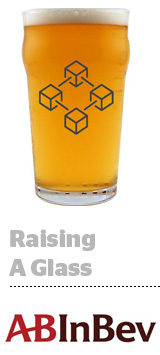
Anheuser-Busch InBev isn’t crying in its beer over the sorry state of transparency in the supply chain – it’s taking action with a mobile campaign built on the blockchain.
It may sound like a stunt, but this is a serious experiment, said Andy Chang, AB InBev’s global head of media and content.
“There are a lot of companies out there trying to capitalize on the blockchain trend,” Chang said. “I can’t speak for them, but in the world of advertising, blockchain has real value for transparency and accountability.”
AB InBev partnered with mobile rewards platform Kiip last month to run moments-based ads for Bud Light, Budweiser, Michelob Ultra, Estrella, Stella Artois and Lime-A-Rita. All campaign and impression-related data is written to the Ethereum blockchain on an hourly basis using a blockchain product developed by Kiip called Single Ledger, which makes the data accessible to anyone with the encryption key.
Because the data is only written to the blockchain once an hour, latency isn’t an issue, said Brian Wong, CEO and co-founder of Kiip.
“It’s a commonly repeated misconception that blockchain is too slow for any type of advertising use case,” he said. “In this case, you don’t have to clear every impression in real time. It can be done in batches and be just as efficient.”
Advertisers can check in on performance data at any point during the campaign and avoid awkward make good negotiations at the end of a flight. Distributing campaign data across a decentralized network means that there’s one source of truth for results.
At the end of every campaign, there are often dozens of hours wasted on debating discrepancies between platforms and trying to agree on the final payout, Wong said.
It’s not that AB InBev’s data scientists mind putting in the time and effort, Chang said. It’s just “really frustrating when we can’t validate benchmarks or create learnings because we’re not confident in the data behind them.”
Using blockchain creates an immutable place for this data to live and the ability to set up a smart contract that spits out a definitive count at the end. AB InBev can also see where all media runs by brand and publisher.
The campaign is still ongoing, but AB InBev is pleased with the visibility it’s getting, and it doesn’t consider this experiment a one-off.
“We’re a big organization, and we’re driven by validated pilots that drive validated learnings,” Chang said. “The pilots we’re seeking with platforms to drive accountability in the media ecosystem is for sure something we’ll continue to do. It’s a long-term trend for us.”
AB InBev isn’t the first brand to glom onto blockchain to address supply chain transparency headaches. AT&T and pharma giant Bayer are both testing blockchain-based solutions to eject waste and fraud from their respective supply chains.
“Blockchain technology has been overhyped with very loose and frankly lightweight use cases,” Wong said. “But it’s also something that can have an immediate impact on a real problem in our industry – something any CMO can relate to and immediately activate.”
This post was syndicated from Ad Exchanger.


More Stories
Warner Bros. Discovery CEO David Zaslav Receives $51.9 Million Pay Package for 2024
TikTok Fave Duolingo Boosts YouTube Shorts Viewership 430% in One Year
Streaming Ratings, Week of March 10: Disney+ Sails to the Top Courtesy of Moana 2